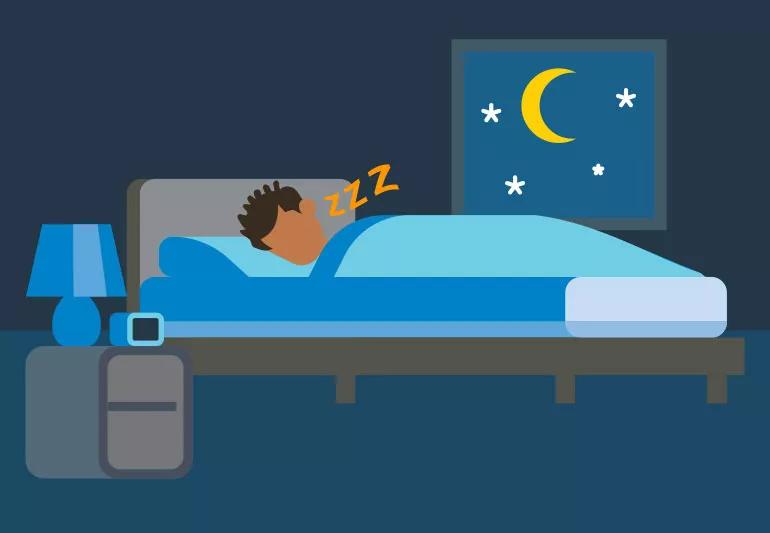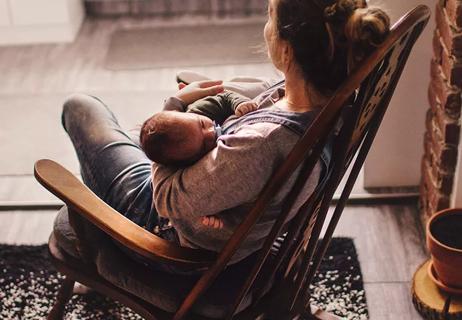Don’t wait until the night before school starts to begin the shift to an earlier bedtime

Mention the word “bedtime” in the summer and you’re sure to hear groans from your kids — especially if they’ve spent the last few months staying up late and sleeping until noon.
Advertisement
Cleveland Clinic is a non-profit academic medical center. Advertising on our site helps support our mission. We do not endorse non-Cleveland Clinic products or services. Policy
When it’s time to go back to school, though, getting back into healthy sleep patterns is a necessity for having the right amount of focus and energy in the classroom.
Kids need more sleep than grown-ups do. While adults need seven to nine hours of sleep per night, the National Sleep Foundation and American Academy of Sleep Medicine say kids ages 5-12 need nine to 12 hours of sleep. Teenagers need eight to 10 hours of sleep to function at their best.
We asked two pediatric sleep specialists to share their best tips for getting back into proper school-year sleep routines. If your kids have lapsed into a “late to bed, late to rise” schedule this summer, here’s where to start.
When are you reading this? Hopefully, tomorrow isn’t the first day of school! If you still have a couple weeks until that morning bell rings, it’s time to work on transitioning your kids’ bedtime and wake-up time.
“If your child’s sleep schedule needs to be shifted, that shift should be slow,” advises pediatric sleep specialist Brian Chen, MD.
Transitioning kids’ sleep schedules too quickly can cause sleep deprivation, which can, in turn, lead to in-school sleepiness, decreased attention span, poor academic and sports performances, and more.
Advertisement
“If you’ve ever had jetlag, you can relate to the feeling of trying to adjust your sleep schedule,” says pediatric sleep specialist Vaishal Shah, MD. “You’re sleeping at the wrong times, your mind is foggy, it’s difficult to wake up and you don’t feel sharp.”
Here’s another reason to start in advance: It could take a while. “Adjusting your kids’ wake-up time by two hours could take one to two weeks,” Dr. Shah says, “so it’s not a good idea to wait until the day before school starts to make changes.”
A few weeks before school begins, start shifting your kids’ wake time earlier by 15 minutes every two to three days. Then, calculate the correct bedtime based on the amount of sleep they need.
In the summer, kids may stay up late and pass out exhausted after long, fun, sun-soaked days. During the school year, though, it’s important to stick to more consistent bedtime/wake-up routines.
Start unwinding before kids even climb into bed. “The last one hour before bedtime should be relatively quiet and calming,” Dr. Shah advises. That means no exercise, no caffeine, no TV and no cell phones.
This is a good tip to follow during the school year, too, but it can be especially tough to enforce it after a summer of lax rules — yet another reason why a slow transition is the best transition.
Darkness signals to kids’ bodies that it’s time to sleep. It also allows their natural melatonin levels to rise, which helps them fall (and stay) asleep. In the early weeks of the school year, though, the sun may still be up when their bedtime approaches.
To mimic nighttime, use heavy drapes that darken your child’s bedroom. “A dark, quiet and somewhat cool room can help kids fall asleep at the right time,” Dr. Chen notes.
You may be accustomed to taking melatonin before bed or using a light therapy lamp in the morning. But what works for adults isn’t always recommended for kids. While these tools can help children who have significant sleep issues, they should only be used under a doctor’s supervision.
“These are very powerful tools that should only be used under the care of a sleep doctor or a physician,” Dr. Chen cautions. “Using them incorrectly can make kids’ sleep issues much more complicated than they have to be.”
Sleep-deprived brains are brains that struggle, period — and this is especially true in kids, who are still growing and developing both physically and emotionally. They need enough sleep to pay attention in school and keep their energy high throughout the day.
Sleep problems contribute to issues like:
Advertisement
They can also make chronic diseases harder to treat.
“I liken it to cigarette smoking,” Dr. Shah says. “Smoking one cigarette does not kill a person, but long-term smoking significantly affects people’s health. If you don’t get enough sleep for a long enough period of time, it begins to take a toll on your health.”
If your child has a hard time getting out of bed in the morning, they may not be getting the right amount of sleep. Or they may not be sleeping very well, even when they’re asleep.
“The best thing you can do to get kids to wake up refreshed and ready to go is to make sure they get a good night’s rest,” Dr. Chen says. “If they’re getting the recommended number of hours of sleep but still have difficulty waking up, that could be a sign that there’s something going on with their sleep quality.”
Just as healthy adults shouldn’t be falling asleep in the middle of meetings at work, neither should healthy kids be catching ZZZs in the classroom.
“If your child is falling asleep in school, it’s important to assess why it’s happening,” Dr. Chen advises. “It could be because they’re not getting enough sleep at night, or there could be an issue with the quality of their sleep.”
Advertisement
Either way, it’s worth speaking about with a doctor. Start with your pediatrician or family physician, who’ll help assess your child’s sleep issues and decide next steps.
Advertisement
Learn more about our editorial process.
Advertisement

From newborn through their teen years, your child’s sleep needs will change

Pediatrician-approved sleep tips

Bleeding is a risk and warrants taking care, but the reward of this lifesaving medication is great

Severe and debilitating headaches can affect the quality of your child’s life

Type 2 diabetes isn’t inevitable with these dietary changes

Applying a hot or cold compress can help with pain